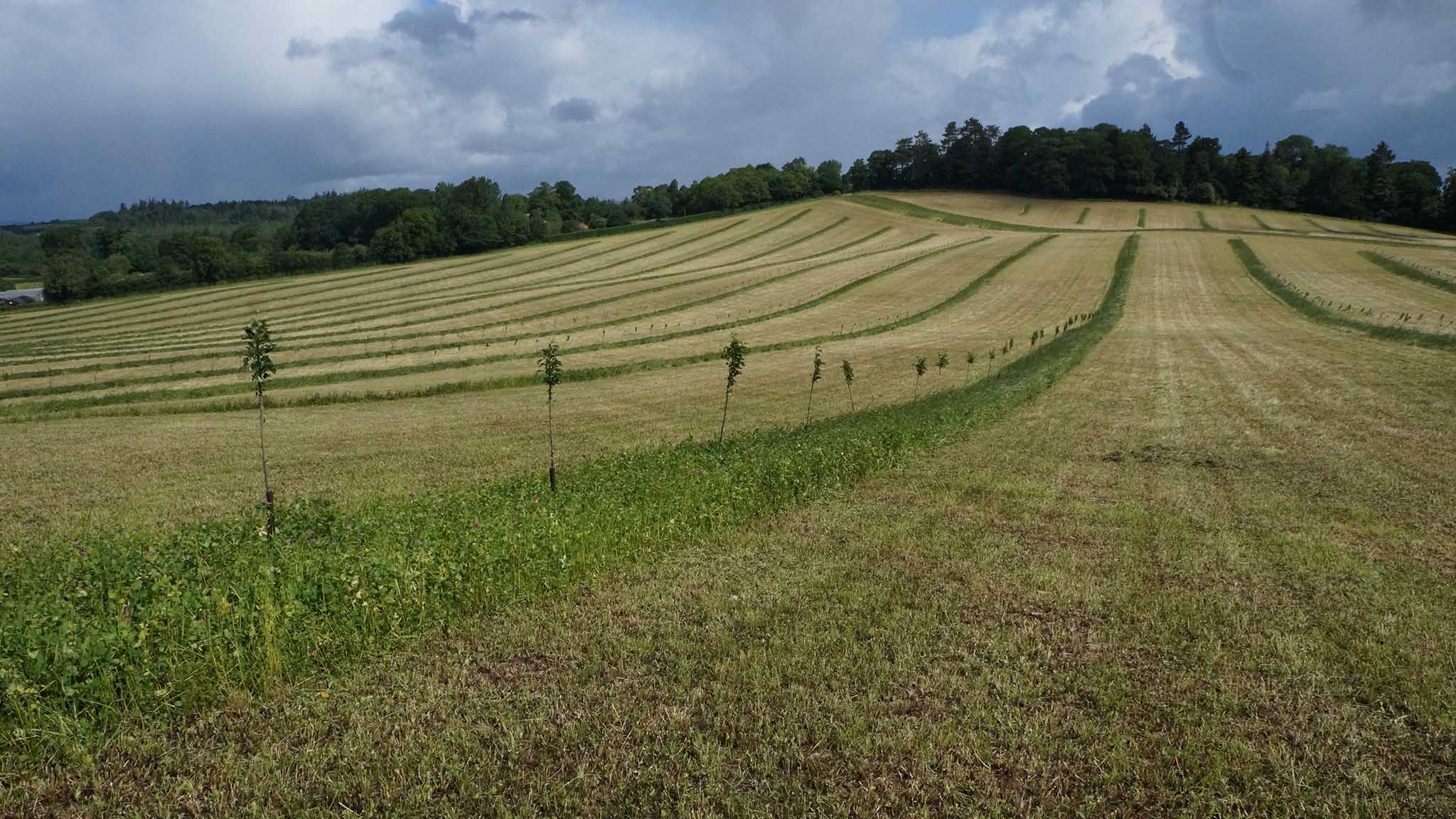This story has been reproduced here with kind permission of the Woodland Trust and Soil Association
Major agroforestry trials should be established during the EU withdrawal period according to a report launched by the Woodland Trust and Soil Association.
Government support for farmer-led research and innovation networks seeking to integrate trees and agriculture should also be trialled – according to the policy document ‘Agroforestry in England: Benefits, Barriers and Opportunities‘.
Agroforestry, the combination of trees and shrubs with agriculture, involves rows of trees through arable crops like wheat, dotted through pasture like parkland, or planted close together to provide cover for plants and animals. Combining trees and farming can increase productivity, diversify farm businesses, protect soils from erosion, store carbon, increase habitat for pollinators and act as a natural flood defence.

Row of apples trees in Dartington’s Broadlears agroforestry field project
The report, which follows on from a successful agroforestry conference in 2017, was launched at the All Party Parliamentary Group on Agroecology, hosted by Baroness Miller and Kerry McCarthy MP.
Woodland Trust Chair of Trustees Baroness Barbara Young, who led a panel discussion at the event, said:
“Agroforestry has the potential to deliver on a wide range of policy objectives in England, yet barriers are preventing widespread adoption. Supporting agroforestry would be a win-win for productivity, environmental protection and agricultural resilience and we strongly believe the government should adopt the recommendations in our report to make agroforestry a priority for the future of farming.”
Sam Packer, policy officer at the Soil Association, said:
“We need immediate action from government on agroforestry, mainstreaming productive farming with trees is long overdue. Agroforestry must become a central part of new farming and land management policy, clearly defined and supported in the Agriculture Bill.”
The recommendations to Government are:
Adopt a practical and clear definition of agroforestry to give clarity to land managers, practitioners and policy makers;
Make on-farm tree planting and management central to the UK’s new environmental land management scheme, rewarding the public goods delivered as a result;
Trial new agroforestry projects that test support mechanisms including advice and funding;
Develop, fund and train a new generation of farm and forestry advisors to break the divide between forestry and agriculture;
Create an overarching agroforestry strategy to inform all departments to overcome the historic separation of agriculture and forestry;
Incentivise long-term tenancy agreements to encourage investment in establishing agroforestry and improving soil health; and
Place trees in the Agriculture Bill to recognise the vital role they play, and support the potential of well-planned tree planting including agroforestry.
At the Dartington Hall estate, an innovating three-tiered agroforestry contract has been made between the landowner, tenant and local businesses growing top fruit, elderflowers and Sichuan peppers. The tenant farmers, Jon and Lynne Perkin, were happy to integrate trees into their arable/silage rotation but as livestock farmers they lacked the appropriate skills, finance and market knowledge.
By teaming up with established local businesses that plant, manage, harvest and market the tree crops, the farm has gained external investment, supported new entrants to access land, increased the diversity of local crops for local markets and now receive the additional benefits of integrating trees with their arable production.
Find out more about agroforestry at Dartington >

This is something I have already flagged up in the National Labour Party Policy Consultation, but you can also flag this up yourselves, either log in as a member of the Labour Party or as a Labour Supporter: https://www.policyforum.labour.org.uk/consultation2018 I’ve pointed out Devon is already growing olives commercially, and Cornwall is growing Tea as a commercial crop, and following Brexit we need more diversity in British farming, and particularly from cattle farming which is nearly a mono-culture in this area, and when maize is harvested for cattle feed, results in a staggering loss of top soil from poor soil management. We need to improve our food security by growing some of the things we have traditionally imported, and reduce both the carbon cost of the farming sector but the methane too, which as a greenhouse gas is 10 times more potent than CO2.